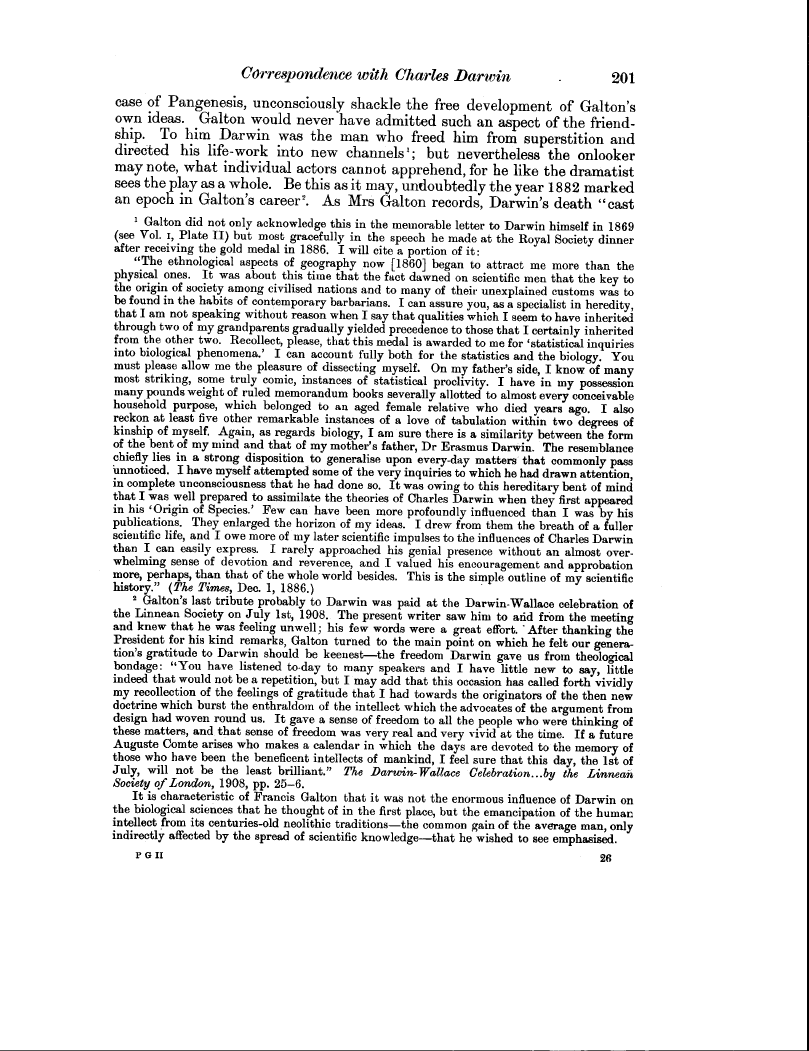Correspondence with Charles Darwin 201
case of Pangenesis, unconsciously shackle the free development of Galton's own ideas. Galton would never have admitted such an aspect of the friendship. To him Darwin was the man who freed him from superstition and directed his life-work into new channels'; but nevertheless the onlooker may note, what individual actors cannot apprehend, for he like the dramatist sees the play as a whole. Be this as it may, undoubtedly the year 1882 marked an epoch in Galton's career 2. As Mrs Galton records, Darwin's death "cast
1 Galton did not only acknowledge this in the memorable letter to Darwin himself in 1869 (see Vol. I, Plate II) but most gracefully in the speech he made at the Royal Society dinner after receiving the gold medal in 1886. I will cite a portion of it:
"The ethnological aspects of geography now [1860] began to attract me more than the physical ones. It was about this time that the fact dawned on scientific men that the key to the origin of society among civilised nations and to many of their unexplained customs was to be found in the habits of contemporary barbarians. I can assure you, as a specialist in heredity, that I am not speaking without reason when I say that qualities which I seem to have inherited through two of my grandparents gradually yielded precedence to those that I certainly inherited from the other two. Recollect, please, that this medal is awarded to me for `statistical inquiries into biological phenomena.' I can account fully both for the statistics and the biology. You must please allow me the pleasure of dissecting myself. On my father's side, I know of many most striking, some truly comic, instances of statistical proclivity. I have in my possession many pounds weight of ruled memorandum books severally allotted to almost every conceivable household purpose, which belonged to an aged female relative who died years ago. I also reckon at least five other remarkable instances of a love of tabulation within two degrees of kinship of myself. Again, as regards biology, I am sure there is a similarity between the form of the bent of my mind and that of my mother's father, Dr Erasmus Darwin. The resemblance chiefly lies in a strong disposition to generalise upon every-day matters that commonly pass unnoticed. I have myself attempted some of the very inquiries to which he had drawn attention, in complete unconsciousness that he had done so. It was owing to this hereditary bent of mind that I was well prepared to assimilate the theories of Charles Darwin when they first appeared in his 'Origin of Species.' Few can have been more profoundly influenced than I was by his publications. They enlarged the horizon of my ideas. I drew from them the breath of a fuller scientific life, and I owe more of my later scientific impulses to the influences of Charles Darwin than I can easily express. I rarely approached his genial presence without an almost overwhelming sense of devotion and reverence, and I valued his encouragement and approbation more, perhaps, than that of the whole world besides. This is the simple outline of my scientific history." (The Times, Dec. 1, 1886.)
2 Galton's last tribute probably to Darwin was paid at the Darwin-Wallace celebration of the Linnean Society on July 1st, 1908. The present writer saw him to and from the meeting and knew that he was feeling unwell; his few words were a great effort. -After thanking the President for his kind remarks, Galton turned to the main point on which he felt our generation's gratitude to Darwin should be keenest-the freedom Darwin gave us from theological bondage: "You have listened to-day to many speakers and I have little new to say, little indeed that would not be a repetition, but I may add that this occasion has called forth vividly my recollection of the feelings of gratitude that I had towards the originators of the then new doctrine which burst the enthraldorn of the intellect which the advocates of the argument from design had woven round us. It gave a sense of freedom to all the people who were thinking of these matters, and that sense of freedom was very real and very vivid at the time. If a future Auguste Comte arises who makes a calendar in which the days are devoted to the memory of those who have been the beneficent intellects of mankind, I feel sure that this day, the 1st of July, will not be the least brilliant." The Darwin-Wallace Celebration ... by the Linnean Society of London, 1908, pp. 25-6.
It is characteristic of Francis Galton that it was not the enormous influence of Darwin on the biological sciences that he thought of in the first place, but the emancipation of the human intellect from its centuries-old neolithic traditions-the common gain of the average man, only indirectly affected by the spread of scientific knowledge-that he wished to see emphasised.
PGII 26

